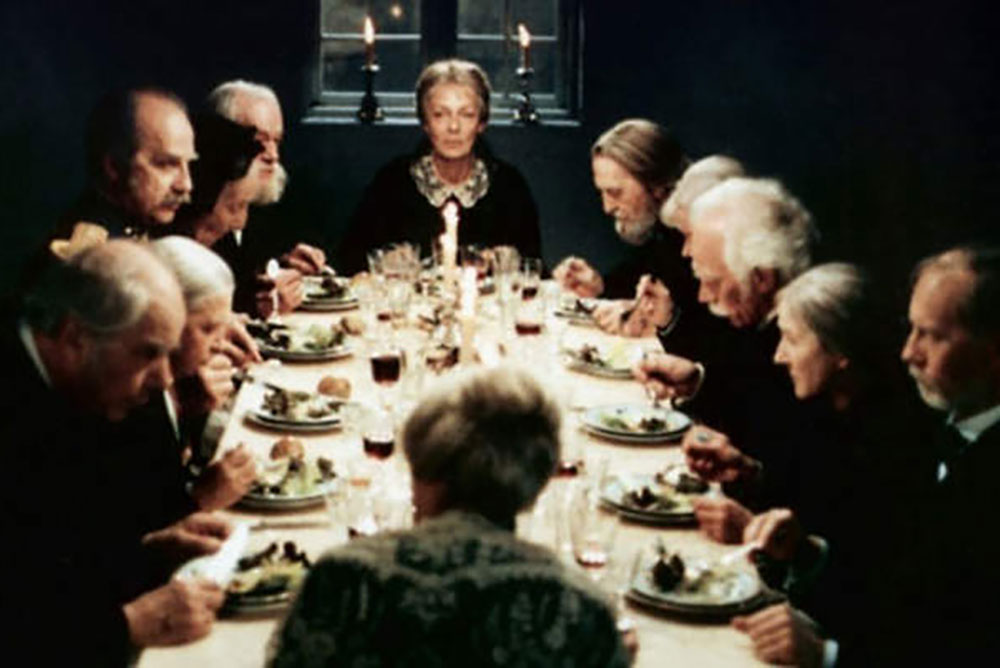
A dour Scandinavian village learns the healing power of the feast table in “Babette’s Feast.”
 By Nancy Pollard
By Nancy Pollard
After owning one of the best cooking stores in the US for 47 years—La Cuisine in Alexandria, Virginia—Nancy Pollard writes Kitchen Detail, a blog about food in all its aspects—recipes, film, books, travel, superior sources, and food-related issues.
ONE OF MY favorite food co- conspirators asked me why I hadn’t featured Babette’s Feast in Kitchen Detail, and my response was, “Oh, anyone who has ever stirred a sauce knows that film.” Well, apparently I was mistaken. In a random test, meaning some conversations about favorite films that involved food, there were a surprising number of people who had never heard of the story by Isak Dinesen (Karen von Blixen) or the film. I would get responses such as, “Oh yes, you mean ‘Out Of Africa.’ ” That was a film that pitted the cringe-worthy acting of Robert Redford against yet another blistering performance by Meryl Streep. Not much to do with cooking, but definitely a Dinesen creation. So, if you have not read her stories, or seen this particular film, you are in for a treat. Babette’s Feast, a gentle film, is about life-changing cuisine and gratitude. It is the perfect ending to the stresses of out pandemic-troubled period, in which religion really does not play a part, but the joy and repercussions of sharing delicious food with strangers are everything.
The Film Is More Than a Feast

Cailles en Sarcophage (Quail in Pastry), Babette’s specialty from her Paris restaurant days, from “Babette’s Feast.”
“Babette’s Feast” began as a novella that was published serially in the Ladies’ Home Journal (1950) and later collected in the volume Anecdotes of Destiny (1958). It was also published in Danish in 1958. The tale concerns a French refugee whose artistic sensuality contrasts with the dreary religious ethos of her new home in Norway (the film places it in Jutland, Denmark). Babette works as a housekeeper and cook for 14 years for two elderly spinster sisters who belong to a strict Christian sect. As the film unfolds, you discover that Babette was a noted chef in Paris, whose very clients she later fought against in the Commune of Paris in 1871, and this “crime” of course necessitated her flight to this austere village.
A gentle humor pervades the film, just as Babette’s cooking quietly pervades the village. And when fortune smiles upon her with a lottery winning, the feast she prepares for the group becomes the metaphor of the story. Much has been made of the feast in movie reviews, but there is so much more to the story. Her financial sacrifice, and the stories of the characters around the table, provide us with their revelations of the meaning of life.
Babette’s Awards and Fans
Babette’s Feast is a favorite film of such dissimilar theologians as Pope Francis and Rowan Williams. When it was released in 1987, it won the Best Foreign Language Film at the Academy Awards, and a BAFTA award as the best film not in the English language. Not surprisingly it received the Best Film of the Year from two film festivals in Denmark. It was included in the Golden Globe nominations and was awarded a special prize at the Cannes Film Festival. And critics still discuss the film’s attributes and meaning. Streaming this film is just a click away through Amazon Prime ($3.99) or on iTunes.
The menu of Babette’s famous dinner has taken on a life of its own, as both restaurants and avid cooks have aspired to re-create it: So if you are looking for an alternative menu for some grand occasion, I give you Babette’s Feast!
Potage à la Tortue (sea tortoise soup) served with Amontillado Sherry
Blinis Demidoff (small buckwheat pancakes) served with caviar and sour cream accompanied by Veuve Cliquot Champagne
Cailles en Sarcophage (quail in puff pastry) served with a Foie Gras and Truffle Sauce accompanied by Clos de Vougeot Pinot Noir
Endive Salad
Savarin au Rhum Avec des Figues et des Cerises Glacées (a raised yeast rum cake surrounded by figs and candied cherries) also served with Champagne
An Assortment of Cheeses and Fruits served with Sauternes
Coffee with a Vieux Marc Grand Fine Champagne Cognac

